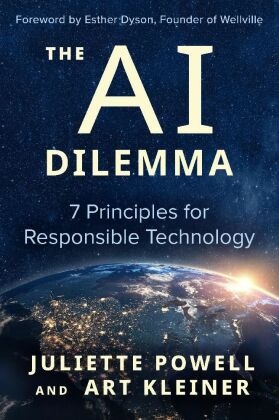
The AI Dilemma - 7 Principles for Responsible Technology
| Verlag | Penguin US |
| Auflage | 2023 |
| Seiten | 240 |
| Format | 15,2 x 1,6 x 23,6 cm |
| Gewicht | 347 g |
| Artikeltyp | Englisches Buch |
| EAN | 9781523004195 |
| Bestell-Nr | 52300419UA |
The misuse of AI has led to wrongful arrests, denial of medical care, even genocide this book offers 7 powerful principles that business can use now to end the harm.
AI holds incredible promise to improve virtually every aspect of our lives, but we can t ignore its risks, mishaps and misuses. Juliette Powell and Art Kleiner offer seven principles for ensuring that machine learning supports human flourishing. They draw on Powell s research at Columbia University and use a wealth of real-world examples.
Four principles relate to AI systems themselves. Human risk must be rigorously determined and consciously included in any design process. AI systems must be understandable and transparent to any observer, not just the engineers working on them. People must be allowed to protect and manage their personal data. The biases embedded in AI must be confronted and reduced.
The final three principles pertain to the organizations that create AI systems. There must be proc edures in place to hold them accountable for negative consequences. Organizations need to be loosely structured so that problems in one area can be isolated and resolved before they spread and sabotage the whole system. Finally, there must be psychological safety and creative friction, so that anyone involved in softwaredevelopment can bring problems to light without fear of reprisal.
Powell and Kleiner explore how to implement each principle, citing current best practices, promising new developments, and sobering cautionary tales. Incorporating the perspectives of engineers, businesspeople, government officials, and social activists, this book will help us realize the unprecedented benefits and opportunities AI systems can provide.
Rezension:
Powell and Kleiner find us on the razor s edge: we cannot go back to a world before AI (nor, they reassure, would we want to). But the path forward, unchecked, is equally unpalatable. Their question is simple: How can we create a world in which we gain value from this technology without losing our humanity? Their answers captured in seven principles are complex and profound. You will not find wiser, more careful, more caring guides to this brave new world than the two authors of The AI Dilemma.
Amy Edmondson, Professor, Harvard Business School, and author of The Fearless Organization
This book could not have come at a more appropriate time. AI is going to dominate our lives even more than it does today. Like cars, the internet, and smartphones, AI will change our lives and improve them but will also require careful management by society to mitigate the possible damage it might cause. Powell and Kleiner have created a thought-provoking work and a must-read for all living in this disruptive moment.
Ron Dembo, author of Risk Thinking and founder and CEO, RiskThinking.AI
The impact of AI will be massive and it s essential that we take steps now to ensure the impact is positive. This thought-provoking book shows what it will take to restore trust in our institutions and in our digital infrastructures so that our most advanced technologies operate on behalf of all people.
Dorie Clark, Wall Street Journal bestselling author of The Long Game and executive education faculty, Duke University Fuqua School of Business
With the benefit of Powell and Kleiner s clear-eyed explanations of what we re actually dealing with when it comes to AI, we may yet avoid the mistakes we made with the internet and pretty much every technology before it. As they demonstrate, this time it matters even more that we do.
Douglas Rushkoff, author of Present Shock, Team Human, and Survival of the Richest
Our future as humans de pends on coexisting with intelligent machines, some that might seem to have supernatural powers. Juliette Powell and Art Kleiner with this book help you understand this coming future and the perils of conventional thinking. I am learning so much, and it is challenging some of my preconceived notions.
Om Malik, writer and Partner Emeritus, True Ventures
